|
The UGC supports the institutions' academic research activities through the allocation of the block grant, funding for research postgraduate places and various competitive research funding schemes such as Theme-based Research Scheme, Areas of Excellence Scheme, General Research Fund, Collaborative Research Fund and Joint Research Schemes with the Mainland and overseas countries. Through financial incentives and encouraging sharing of best practices among institutions and with overseas counterparts, the UGC also encourages institutions to further strengthen and broaden their endeavors in transferring knowledge, technology and other forms of research outputs into real socio-economic benefits and impacts for the community and society.
Whereas the RGC is responsible for carrying out assessment of research grant proposals for competitive projects, the UGC established a Research Group to advise on the strategy to promote excellence in research and to review the research assessment and funding methodology. Its objective includes working closely with institutions as how the research funding and research postgraduate student places should be best distributed to drive excellence, how to encourage research while keeping an appropriate balance with teaching, how to maintain and promote role differentiation, what is the best and effective way to allocate the research resources, etc.
The UGC has continued its efforts in taking the research results to the community by organising lectures and publishing newsletters to share the research findings and policy recommendations with the community.
UGC Funding Support for institutions
(a) Research Expenditure and Funding
The UGC-funded institutions continue to pursue excellent research. Their reported aggregate expenditure on research in 2010/11 amounted to HK$6,948.3 million, representing 41% of the total expenditure in academic research of the institutions, and 0.38% of Hong Kong GDP. UGC and RGC funding, in the form of block grants and competitive research grants respectively, constituted the bulk of research funding for the institutions. Together, the two sources of funding made up about 74% of the total research expenditure in 2010/11- breakdown is at Table 1.
Table 1 – Research
Expenditure of UGC-funded Institutions 2010/11
(b) RGC's Research Funding Schemes
Apart from the block grants allocated by the UGC, the various funding schemes administered by the RGC together represent the largest single source of funding for supporting academic research in Hong Kong's higher education. These funding schemes are managed by the RGC based on competition and peer review. With the transfer of administration of the Areas of Excellence Scheme to the RGC in February 2012, annual research funding to be distributed by the RGC will amount to about $1.1 billion starting from 2012/13, as follows:

|

|
(c) Earmarked Research Grant
For 2011/12, the RGC distributed HK$795 million through the Earmarked Research Grant, representing an increase of about 2.6% as compared with 2010/11. There are four main funding schemes under the RGC Earmarked Research Grant: the General Research Fund (GRF); the Collaborative Research Fund (CRF); the Direct Allocation; and the Joint Research Schemes. The budgeted distribution amongst the major funding schemes is set out in Table 2.
Table 2 – Budgeted
Distribution of Earmarked Research Grants 2011/12
Details of how these schemes operate and the success rates can be found on the RGC website (www.ugc.edu.hk/eng/rgc) and in its Annual Report.
(d) Research Endowment Fund
The $18 billion Research Endowment Fund (REF) was established in February 2009 after approval was granted by the Legislative Council. The Fund has been set up as a trust under the Permanent Secretary for Education Incorporated. Its investment income replaces a large portion of recurrent subvention originally allocated to the RGC as Earmarked Research Grant, thus providing greater funding stability and certainty. A portion of its investment income will also support theme-based research, thus allowing the institutions to work on research proposals on themes of a more long-term nature and strategically beneficial to the development of Hong Kong.
An injection of $5 billion into the Research Endowment Fund was proposed in the Policy Address delivered by the Chief Executive in October 2011 and approved by the Legislative Council in January 2012. Of that, a portion of the injection will provide research funding to the self-financing tertiary institutions on a competitive basis.
(e) Greater Competitiveness on Allocation of Research
Resource
As elucidated in the "Aspirations for the Higher Education System in Hong Kong", the UGC will introduce greater competitiveness in allocating research funding and research postgraduate places in order to promote excellent research in UGC-funded institutions. It is the outstanding research that drives innovation contributing to society and the economy. All our institutions aspire to be able to compete with the best in the world. The new funding arrangement of using institutions' achievement in RGC's Earmarked Research Grant to inform the distribution of up to 12.5% of the Block Grant as indirect/on-costs will be implemented over a period of nine years starting from 2012/13, and will be reviewed before the end of the first triennium. Over a period of five years starting from 2012/13, an increasing portion of the 5 595 research postgraduate places will be allocated through five competitive methods, and 50% of such places will be competitively allocated by 2016/17.
In the course of implementing its plan to enhance competitiveness in allocating research funding, the UGC noted that humanities and social sciences (HSS) projects generally have a lower project cost and that HSS academics are less active in applying for research grants. The UGC has taken certain measures to strengthen research in such disciplines:
(i) ring-fencing 18% of the new indirect/on-costs element in the research portion of the Block Grant for HSS research;
(ii) providing additional annual funding of $20 million to the RGC for HSS research, in particular to recognize the greater need of HSS projects for Principal Investigator's time (in the form of teaching relief), and part of this funding is used to introduce the new scheme at (iii) below); and
(iii) creating a new funding scheme to recognise the outstanding investigators in HSS disciplines. Details of the new scheme are at (i) below.
(f) A New Sharpened Research Assessment Exercise
The UGC seeks to reward excellent research and strengthen differentiation. To this end, the UGC in agreement with the eight UGC-funded institutions decided that a new Research Assessment Exercise (RAE) will be conducted in 2014. The coming RAE will sharpen the measurement of research quality. Results of the RAE will form the basis of the distribution of the remaining part of the research funding in the Block Grant. The UGC is consulting institutions regarding the implementation of the coming RAE.
(g) Theme-based Research Scheme
The Scheme is funded by the investment income from up to $4 billion of the Research Endowment Fund (i.e. about $200 million per annum assuming a 5% return). The objective of the scheme is to focus academic research efforts of the UGC-funded institutions on themes of strategic importance to the long-term development of Hong Kong. The Education Bureau has established a Steering Committee on Research Themes to advise on the selection of themes. After a series of consultation, including with the UGC, the RGC and the community, three themes were selected. Under these themes, 11 grand challenge topics have been identified by the RGC in consultation with the academic community through invitation of white papers and holding of workshops. These topics have been endorsed by the Education Bureau upon the advice of the Steering Committee. The themes and topics are set out below:
Theme: "Promoting good health"
– Infectious diseases
– Genomic medicine
– Stem cells and regenerative medicine
Theme: "Developing a sustainable environment"
– Water pollution and water treatment
– Sustainable built environment
– Organic photo-voltaic and light emitting
diodes
– Air quality
Theme: "Enhancing Hong Kong's strategic position
as a regional and international business centre"
– Hong Kong's future as an international
financial centre
– Promoting Hong Kong's business through
networking capability
– Promoting Hong Kong as a centre of
excellence for business services innovation
– Entrepreneurship and enterprise organization
The first round of invitation was issued in September 2010 and results announced in July 2011. 89 preliminary proposals were received and six of them were awarded funding totaling some $248 million.
The second round was launched in July 2011 with 46 preliminary proposals received and 17 short-listed for submission of full proposals. Grants are expected to be awarded in July 2012.
(h) Early Career Scheme
The RGC has created a new peer reviewed funding scheme to attract, support and nurture new junior faculty members to work in Hong Kong and to strengthening the teaching–research nexus by providing support to undertake independent research work and develop educational activities.
There will be two levels of award – (a) Early Career Grants; and (b) Early Career Awards – the top awardees will be given an honorary title in addition to the funding for research and educational activities.
The first round of invitation was launched in September 2011. 338 applications were received. The grants will be awarded in June 2012.
(i) Prestigious Fellowship Scheme for Humanities
and Social Sciences Panel
To recognise the outstanding investigators in Humanities and Social Sciences disciplines, the RGC has created a new fellowship scheme in 2011/12. The new scheme will provide extended time-off to relieve all or part of the Humanities and Social Sciences academics' teaching and administrative duties so that they can focus on research and writing. Applications were invited in September 2011. A new evaluation panel will be set up to assess the applications. The grants were awarded in June 2012.
(j) Hong Kong PhD Fellowship Scheme
To attract the best and brightest students in the world, irrespective of their country of origin and cultural background, to pursue their PhD studies and research in UGC-funded institutions, the RGC launched the annual Hong Kong PhD Fellowship Scheme in September 2009.
The Fellowship provides a monthly stipend of HK$20,000 and travel and research-related allowance of HK$10,000 per year for the awardees for a period of three years. 114 candidates among some 4 000 applicants from over 100 regions received the award in the second round exercise for 2011/12.
To promote the third round of the Scheme for 2012/13, RGC Chairman and colleagues from institutions conducted outreach visits to Germany, the Netherlands, Italy and India from October to November 2011, and visited 20 top-tier institutions to exchange views with university staff as well as the students. 15 information sessions were held during these outreach visits. There were 4 253 applicants from 117 regions for the third round. By the end of March 2012, 162 candidates accepted the offer of fellowship.
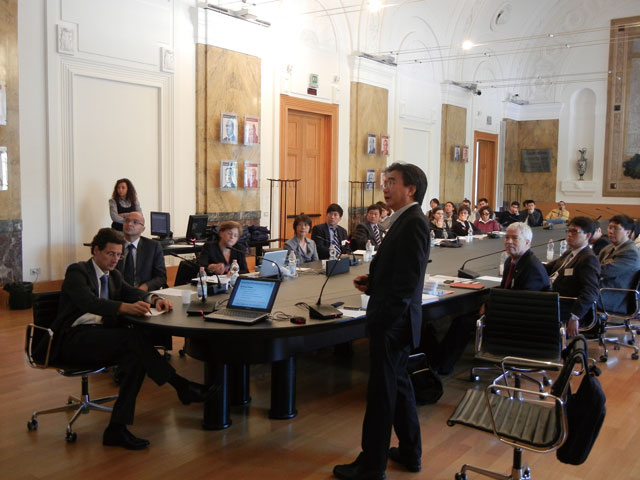
Outreach visits for promotion of the 2012/13 Hong
Kong PhD Fellowship Scheme
|
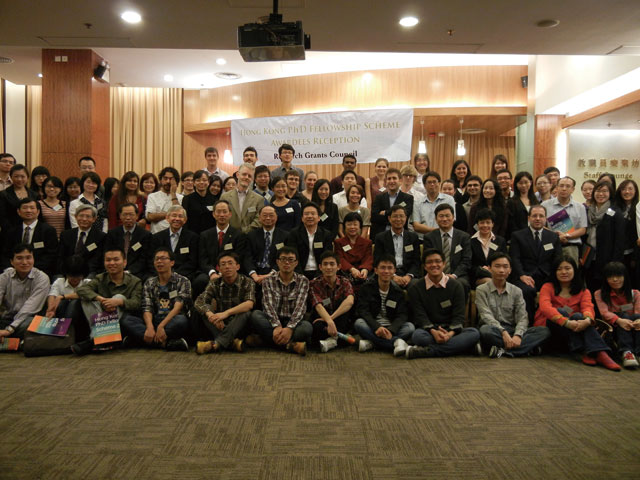
The awardees of the 2011/12 round of the Hong Kong PhD Fellowship Scheme, RGC members, and representatives of institutions together with some awardees of the 2010/11 round met at a tea reception on 16 November 2011 to exchange views and share experiences.
|
This prestigious Scheme unites top international research postgraduate students and Hong Kong's world-class research institutions. It helps Hong Kong to excel at research and widen our pool of talent and contacts. This also furthers internationalisation of the higher education sector.
Knowledge Transfer
As a natural extension of institutions' teaching and research activities, "knowledge transfer" has become the third core function of Hong Kong's higher education institutions. The UGC strongly believes that the transfer of knowledge between institutions and the society would help bring about socio-economic impact and improvements to the community and businesses. This in turn would also help enrich institutions' research mission, thereby enhancing the international competitiveness of the local higher education sector. The UGC is encouraged to note that over the years, knowledge transfer activities haven taken roots in multiple disciplines, including health sciences, arts and humanities and the social sciences, architecture, business and economics, city planning and the environment, science and technology as well as engineering.
Since 2009/10, the UGC has introduced an additional stream of recurrent funding earmarked for the institutions to strengthen and broaden their endeavors in knowledge transfer. It is welcoming to see that very considerable progress has been made by all institutions which have made good use of the funding. All institutions have included knowledge transfer in their mission statements and strategic documents while academic staff has also manifested a higher degree of commitment to the initiative.
Much of the UGC funding was intended to be used for building institutions' capacity for knowledge transfer and that has indeed been the case with all of them having established or reinforced their knowledge transfer offices for better coordination and promotion. There has also been increased recognition of the importance of enterprise and entrepreneurship as an integral element of knowledge transfer. It is hopeful that the promotion of entrepreneurship would resonate with the new 4-year academic structure with students to be given with more opportunities to work with start-ups and networks could be formed to link undergraduate and postgraduate students, researchers, alumni, faculty members and other staff.
Considerable attention has been given by all universities to the many different ways in which benefit can be transferred to industry and the community. All institutions have engaged to some degree in consultancy, research contracts and collaborative research, spin out companies and licensing. They have all engaged in some form of Continuing Professional Development which was directed at business or social enterprises. Institutions have also employed a variety of other mechanisms to particularly cater for knowledge transfer in the arts, humanities and social sciences. These would include the setting up of websites for dissemination of knowledge, the organization of seminars, workshops, conferences, exhibitions and other public events.
The overall level of KT activity is healthy and there are indications that it is increasing. Income from knowledge transfer activities can also be expected to increase over the coming years as they become more professional.
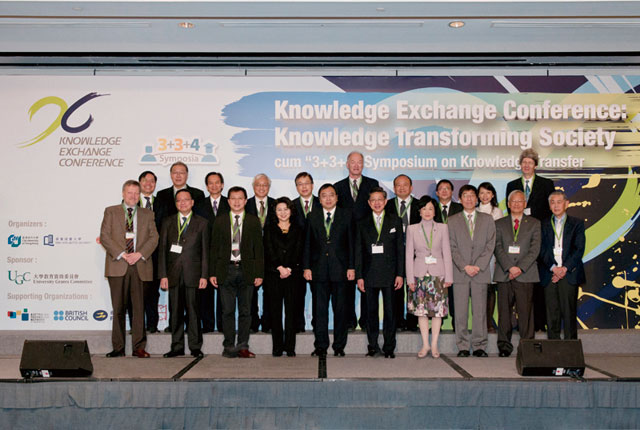
|
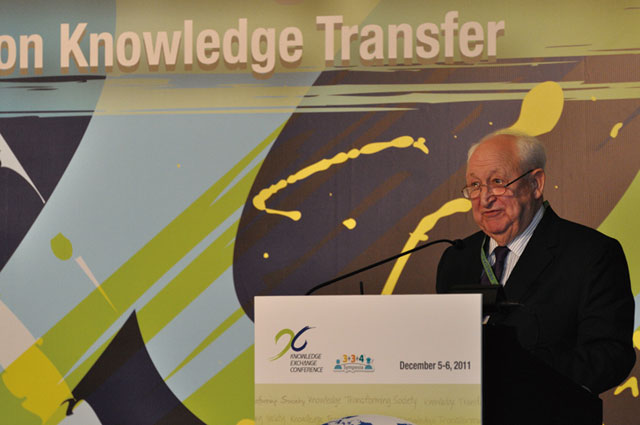
|
| The UGC sponsored the eight institutions to co-organise a "Knowledge Exchange Conference" in December 2011 |
In December 2011, the UGC sponsored the eight institutions to co-organise a two-day "Knowledge Exchange Conference", attracting renowned overseas speakers, representatives from the industries and the businesses, senior management, academic staff, knowledge transfer practitioners and students of our institutions. The conference showcased the success stories and the collaborate effort of UGC-funded institutions in delivering knowledge transfer activities.
Allocation of Knowledge
Transfer Recurrent Funding to Institutions, 2011/12
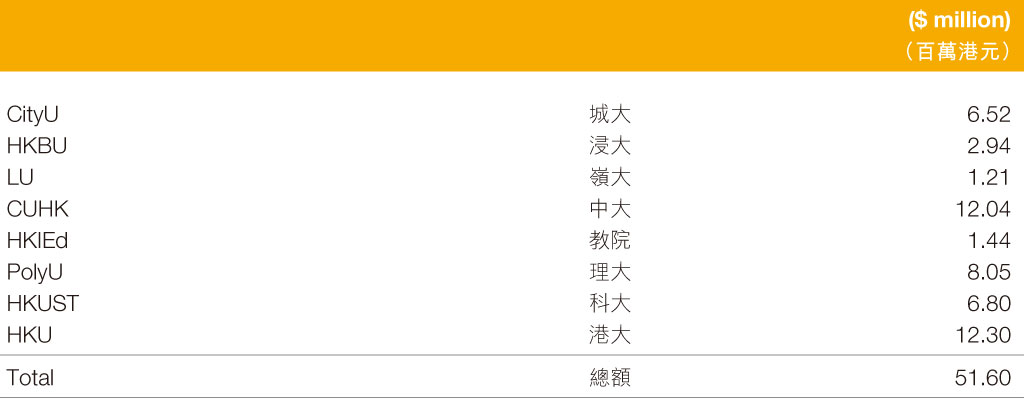
|



